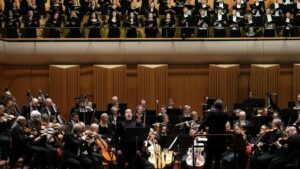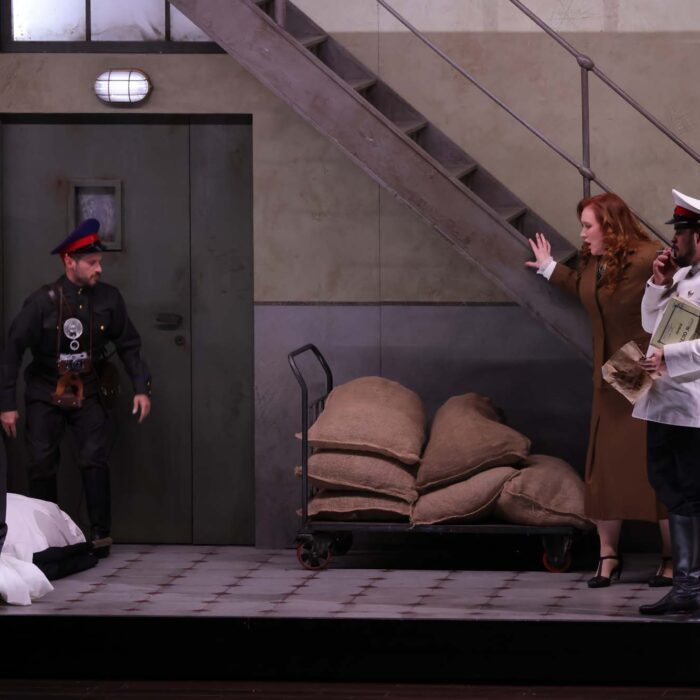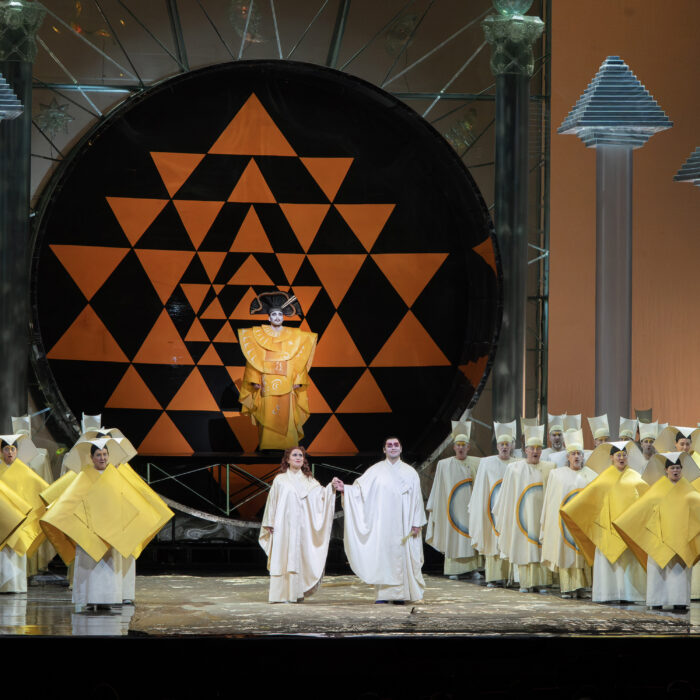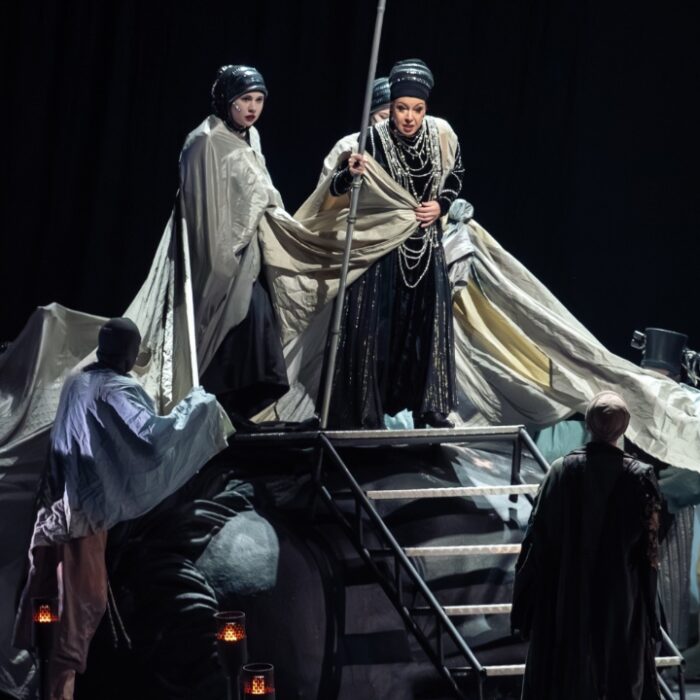
Swedish Radio Choir Review 2023: Rachmaninoff’s 150th Anniversary, ‘The Bells’
By John Vandevert(Photo Credits: Arne Hyckenberg)
The Swedish Radio Choir, on December 9, performed one of Rachmaninoff’s last pieces before his emigration from Russia, namely his choral symphony, “The Bells” (Op. 35), composed right before his English tour and other notable works like his “All-Night Vigil” (Op. 37) and his acclaimed “Vocalize” (Op. 34, No. 14). Accompanied by the Swedish Radio Symphonic Choir who, prior to the evening’s second part, performed in exceptional synchronicity and nuance Edward Grieg’s Violin Concert in B Major with the esteemed German violinist Frank Zimmermann, Rachmaninoff’s mighty work was interpreted by three equally celebrated young soloists, each at critical apexes in their careers.
Hailing from occupied Ukraine, tenor Dmytro Popov exemplified the sleigh bells (in Russian bubyentsi) with their joyful cacophony signalling the “magical pleasure” which lies ahead the galloping sleigh ablaze with hope and dreams, a metaphor for adolescent optimism. Russian soprano Olesya Golovneva personified the wedding bells (svadyebnie kolokola) and the “the waves of melodious sounds” which spring from the bliss of divine union promising the newly devoted a life of selfless commitment to each other. But all things inevitably come to their conclusion, and following the fiery third movement, its alarm bells accostingly demanding a fitting compensation for a most heinous crime unseen but indescribable and unforgivable nonetheless which can only be paid in fear and pain, the funeral knell tolls (pokhornie kolokola), embodied by Russian bass Rodion Pogossov.
Saturated in a rich and highly intertextual panoply of cultural and musical references, the work contains many elements. From Edgar Allen Poe’s eponymous and posthumous poem, sent to the composer in its Russian translation by cello student Maria Danilova, the musical influences of Rimsky-Korsakov, Tchaikovsky, and Mussorgsky, the second a forceful influence upon him, and Gregorian chant and cathedral bells, elements in the composer’s ear thanks to his experiences attending the Orthodox Church during his youth. As a result, “The Bells” is not only an example of how far Rachmaninoff had come since his psychological reset in 1900, ironically resulting in his second piano concerto, but his effective merger of life and music.
A Bit of Background
One may naturally ask why I begin this review with a reflection on history, however fantastic it may be? To this, I ask you to keep reading. Much like Stravinsky, Rachaminoff’s music is both incredibly “Russian” and incredibly idiosyncratic, incredibly current and yet unignorably “Old World.” These tensions radiate throughout Rachmaninoff’s oeuvre, leading figures like Aaron Copland to note that Rachaminoff’s brooding and orgiastic style both draws in and alienates listeners, a reflection of his internal world in the early 1910s no doubt.
Resulting from this wrestling between languishing in nostalgia and looking to the burgeoning future, Rachmaninoff’s “The Bells,” while of course written before the 1917 October Revolution, a moment in history which changed Russian life forever, exemplifies the twisting and turning of life, the intoned “mortal coil.” The bells do not only announce life, marriage, and hope but vengeance, vindictive aggressiveness, and most importantly death. It is not a sound containing one meaning but rather a vast array of potentials. The bells signal but what is being signaled?
Throughout the world, from many of the mightiest concert halls to the more humble gathering places, musicians of all kinds along with their adoring public are celebrating the 150th anniversary of one of Russia’s most beloved composers. It’s of no surprise that Sergei Rachmaninoff, to whom the Western operatic establishment has never been particularly focused on programming outside of the rare appearance of “Aleko“ and “Francesca da Rimini,” felt alienated from the aesthetic thought-style which he came to reside within upon his departure from Russia in 1917.
As the fabled night goes, when he was at home at his “Ivanovka” estate in Uvarovsky, south of Moscow, a horde of enraged peasants came to his front gate and there, Rachmaninoff laid eyes on the face of a Russia he did not know and, in many respects, didn’t want to know as his conception of Russia was one of rose-tinted peasant innocence. Nevertheless, so fearful was he that on September 5 after a performance in Yalta, the 44-year old composer left his homeland never to return during his lifetime.
A Display of Potent Musicality
From the moment it began to the moment it closed, it was immediately appreciable that the Swedish Radio Choir was not only a master of early music, their interpretation of Bach’s “Wachet Auf” a most triumphant event, but likewise giants of late Romanticism as well. Such an ability to artistically master the subtleties and nuances encased with the musical language and “intonational dictionary,” to steal Boris Asafiev’s term, of different, practically antithetical, compositional epochs seems an inherent aspect of the Radio Choir. Nevermind the fact that Rachaminoff’s third movement, in many ways, is both one of the most demanding and dare I say “Verdian” moments in the composer’s oeuvre, the diversity of tone, intention, and delivery by the choir was spectacular.
Directed by Daniel Harding, a most exuberant conductor whose capacity for Mahlerian sentimentalism pairs well with his knack for Straussian grandeur and taste for sophisticated yet playful gestures and articulations, it’s only natural that the soloists would be as cerebral in their artistic choices. And, to no one’s surprise given their rigorous training and international careers, Popov, Golovneva, and Pogossov exemplified the epitome of the discriminating singer, the one for whom artistry is not an accident but a purposeful choice and the result of uncompromising diligence and intuitive submissiveness to the needs of the music and its own purpose. A reflection on the singers themselves is necessary to articulate my observation as to not be mistaken for a sycophant.
Beginning the work, Popov excelled as the Lenskian spirit encased within the soul of the young spitfire whose starry-eyed love affair with life has just begun. His stamina, lyrical nature, and timbral confidence were neither the empty postures of the Correli/Björling copyist, but of a truly unique individual. It’s neither excessive nor extreme to say that Popov’s open throat musicianship was a consummate expression of opera as the “high art” it is and deserves to remain as so long as there are singers dedicated to the task, as Popov valiantly seems to be and is capable of being. The climax, as was apparent for all, was incredible, Popov’s voice soaring as if born only moments before, escaped from the safety of the infantile home into the world of endless opportunity.
Speaking of “high art,” the caressing second movement was rendered supremely beauteous thanks to Golovneva and her smooth bel canto dynamism which, while only faintly askew near the top of her upper register, radiated the spectre of a musical epoch long since past. At moments of high tension, climax, and in complimentary moments of sumptuous release, Golovneva’s penchant for dramaturgy through vocal rather than histrionic means, in other words her intellectual usage of the tools at her disposal like dynamics, color, and diction, proved some of my most favorite elements of the night. A special mention must also be given to her diminuendo’s as they were just sublime in their control, placement, and artfulness. Neither too much nor too little, Golovneva imbued Rachmaninoff with grace.
The final movement held its own surprises, however, Pogossov’s stalwart profundity and imperial beauty both visually and musically spoke to the true intentions of Rachmaninoff’s anima mundi symphonism. As he breathed, so did we, and the relaxed vitality in which Pogossov’s voice emanated throughout the hall can only be paltrily described by using words alone. Yet, words can reflect the impressive way Pogossov channeled the essential geist of Russian bass clef giants like Hvorostovsky, Maksakov, and Chaliapin while simultaneously allowing himself to convey his own being, his own sense of artistic self. All three soloists did this, yet with Popov and Pogossov I truly felt as if I were listening to a living incarnation of classical singing’s golden past.
Speaking about “The Bells,” the great critic and musicologist Boris Asafiev said, “Rachmaninov approached his poem ‘The Bells,’ created on the eve of the first imperialist war, quite consistently from his entire circle of wary calls and forebodings of the anxieties of his homeland.” Indeed, what was experienced that Friday evening in Stockholm was a glimpse into the mind of one of Russia’s most beloved yet most estranged composers. Like Stravinsky, of which the final movement is noticeably reminiscent, Rachmaninoff both loved and feared his homeland.
As an adoptee from Russia, I both love and fear my homeland as to many Russian-born emigres as well. Time will tell as to what road Russia will take, or more accurately Putin, but it can be said that the evening was a reminder that the present is much like the past, changing little and only circling back on itself. Two Russians and a Ukrainian joined forces in a show of artistic brilliance and that must count for something, especially now. If only for one night, the several bows signaled something did really happen which can be explained as a real sharing of humanity.
Categories
Reviews

